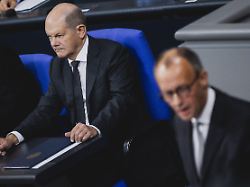Debate on economic development
Merz’s letter to Scholz causes “slight irritation”
February 12, 2024, 5:33 p.m
Listen to article
This audio version was artificially generated. More info | Send feedback
Traffic light partners and the Union agree on one thing: Germany’s economy needs to be stimulated. However, opinions differ on the approach. Chancellor Scholz wants more money for the Growth Opportunities Act – and is irritated by a proposal from opposition leader Merz.
Chancellor Olaf Scholz is not satisfied with the possible agreement in the mediation committee on tax relief for companies. “The Chancellor is of the opinion that a larger volume would be the right thing for the German economy,” said government spokeswoman Christiane Hoffmann in Berlin. But we have to see what is possible together with the federal states. At the same time, she emphasized that there was “a slight irritation” in the federal government about the letter from CDU leader Friedrich Merz and CSU regional group leader Alexander Dobrindt to the Chancellor with suggestions for an economic development program.
This contradicts the Union’s resistance to major relief from the Growth Opportunities Act. In preliminary negotiations on Friday, federal and state representatives agreed on a possible compromise on the so-called Growth Opportunities Act, which is stuck in the mediation committee of the Bundestag and Bundesrat.
Negotiators in the traffic light coalition now estimate the planned relief volume for the economy – primarily through additional depreciation options – at 3.2 billion euros per year, only around half of the previous plans. Approval of the preliminary compromise, which is intended to reduce the burden on states and municipalities, may still fail in the mediation committee due to the Union-led federal states.
Habeck in conversation with Lindner
Hoffmann said anyone who wants to help the economy quickly should agree to the law. It could provide “massive support” to companies. However, economists spoke of a drop in the ocean. Finance Minister Christian Lindner has also announced that the federal government will present a package of measures in the spring to strengthen the location. He also believes lower tax rates for companies are necessary. Hoffmann said that the Chancellor’s first concern was the current Growth Opportunities Act. He took note of the debate about tax cuts.
The spokeswoman pointed out that the government is also working on accelerating planning and reducing bureaucracy. Last week, Scholz had already shown reservations about Lindner’s considerations and Vice Chancellor Robert Habeck’s proposal to set up a special pot worth billions for investments.
A spokesman for the Ministry of Economics simply said that Habeck was in discussions with Lindner. The CDU-affiliated Economic Council supported Lindner’s call for an “economic turnaround”. “There is only scope for tax cuts if the social gifts from the traffic light that are harmful to growth are collected again,” said Secretary General Wolfgang Steiger. “Germany obviously has a lot of scope for tax cuts,” he added, referring to tax revenues of 916 billion euros.
